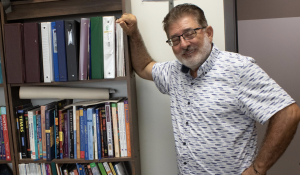Communication studies will study success of hybrid classes
March 19, 2014
The communication studies department is conducting a self study this semester to measure the effectiveness of general education hybrid courses, with special attention being paid to the Public Speaking and Communication Experience classes.
The mandatory review occurs every four academic years and was started last semester with the formation of a review panel of university faculty members and an external consultant. The focus of the review is to analyze and evaluate whether hybrid courses are helping students, and to identify any potential problems.
“More-and-more we are hearing that online courses are the way of the future,” said Communication Studies Chair Steve Buss. “We want to make sure that the education given in these courses is as quality as any other regular course.”
Because of the nature of hybrid courses, where limited in-class meetings are supplemented with online lectures and work, there is often a disconnection between students and professors that cannot be replaced by online interaction.
“Instructors can find themselves in frustrating positions in a hybrid course,” said Public Speaking Professor Mark WIlliams. “They are often on such tight schedules inside the classroom that they don’t have a chance to interact with the students or get to know them.”
Communication studies major Jose Fraga said the issues with taking a hybrid section of public speaking his first semester was he often could not find time for online video content, and he felt distant from his instructor.
“If the class had met twice a week instead of only once, it would have been better,” Fraga said. “Really the only advantage, besides the flexibility, was the fact that it was available at registration.”
Both courses under review are lower division general education that have higher seat counts and serve a large number of students, some of whom may not be ready for the self-reliant structure of most hybrid courses.
In addition to bridging the gaps in student-professor interaction and communication, Buss said another goal of the review is to ensure online course material offered is effectively used in class.
The review began last summer when the Communication Studies department submitted a proposal for a focus review of hybrid courses.
The Program Review Oversight committee assembled a subcommittee of faculty outside of the Communication Studies department and brought in an external consultant from CSU Los Angeles’ Communications department.
“We basically come in and ask ‘what are your grievances?’ to professors and students,” said Andrew Hertzoff, head of the review subcommittee. “What makes it difficult is the fact that communications is such a large department.”
Hertzoff said a key component of the review is looking at demographics of the students who take them, such as average GPA, graduation rates and the other types of classes they take, and how these variables translate into the results of the hybrid courses.
“There has to be an awareness of who is successful in hybrids,” Hertzoff said. “There must also be more transparency made available about the nature of these courses.”
The review subcommittee and the external consultant are both in the process of writing reports of their research and improvement recommendations to submit to the Program Review Oversight committee, which will then be given to the department by the end of the academic year as an advisory document to help foster positive changes.
“It’s an extremely useful process, I think,” Hertzoff said. “It helps us as be thoughtful and reflective of the things that we are doing, so we can always try to improve.”


























































































































